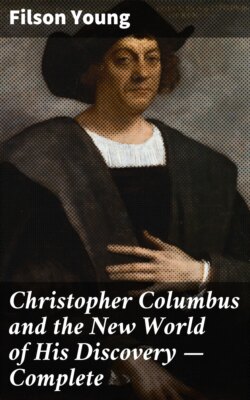Читать книгу Christopher Columbus and the New World of His Discovery — Complete - Filson Young - Страница 33
На сайте Литреса книга снята с продажи.
OUR LADY OF LA RABIDA
ОглавлениеTable of Contents
It is a long road from Santa Fe to Huelva, a long journey to make on foot, and the company of a sad heart and a little talking boy, prone to sudden weariness and the asking of innumerable difficult questions, would not make it very much shorter. Every step that Christopher took carried him farther away from the glittering scene where his hopes had once been so bright, and were now fallen to the dust; and every step brought him nearer that unknown destiny as to which he was in great darkness of mind, and certain only that there was some small next thing constantly to be done: the putting down of one foot after another, the request for food and lodging at the end of each short day’s march, the setting out again in the morning. That walk from Santa Fe, so real and painful and wearisome and long a thing to Christopher and Diego, is utterly blank and obliterated for us. What he thought and felt and suffered are things quite dead; what he did-namely, to go and do the immediate thing that it seemed possible and right for him to do—is a living fact to-day, for it brought him, as all brave and honest doing will, a little nearer to his destiny, a little nearer to the truthful realisation of what was in him.
At about a day’s journey from Huelva, where the general slope of the land begins to fall towards the sea, two small rivers, the Odiel and the Tinto, which have hitherto been making music each for itself through the pleasant valleys and vineyards of Andalusia, join forces, and run with a deeper stream towards the sea at Palos. The town of Palos lay on the banks of the river; a little to the south of it, and on the brow of a rocky promontory dark with pine trees, there stood the convent of Our Lady of La Rabida. Stood, on this November evening in the year 1491; had stood in some form or other, and used for varying purposes, for many years and centuries before that, even to the time of the Romans; and still stands, a silent and neglected place, yet to be visited and seen by such as are curious. To the door of this place comes Christopher as darkness falls, urged thereto by the plight of Diego, who is tired and hungry. Christopher rings the bell, and asks the porter for a little bread and water for the child, and a lodging for them both. There is some talk at the door; the Franciscan lay brother being given, at all times in the history of his order, to the pleasant indulgence of gossiping conversation, when that is lawful; and the presence of a stranger, who speaks with a foreign accent, being at all times a incident of interest and even of excitement in the quiet life of a monastery. The moment is one big with import to the human race; it marks a period in the history of our man; the scene is worth calling up. Dark night, with sea breezes moaning in the pine trees, outside; raying light from within falling on the lay brother leaning in the doorway and on the two figures standing without: on Christopher, grave, subdued, weary, yet now as always of pleasant and impressive address, and on the small boy who stands beside him round-eyed and expectant, his fatigue for the moment forgotten in curiosity and anticipation.
